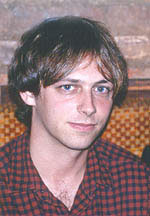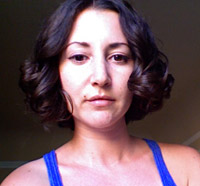
| Jacket 38 — Late 2009 | Jacket 38 Contents page | Jacket Homepage | Search Jacket |
This piece is about 3 printed pages long.
It is copyright © Sophie Sills and Jacket magazine 2009. See our [»»] Copyright notice.
The Internet address of this page is http://jacketmagazine.com/38/r-berrigan-anselm-rb-sills.shtml
Anselm Berrigan
To Hell with Sleep
reviewed by
Sophie Sills
Letter Machine, 2009. Paperback, isbn: 9780981522715, US$10.00
^
Anselm Berrigan’s “To Hell with Sleep” is an interrogation into the wild discordance of consciousness. Written after the birth of his daughter, the poetry, unhinged and contorted, presents us with a space without limits, the experiential rather than analytical, “i dunno my/ owned impression.” Berrigan gives us his “no, study of thinking,” a dreamscape of American life, merging the daily with anxiety lists of “should na done[s].” Like it’s title, “To Hell with Sleep” is a decision to refute the drowsy existence of an unexamined life. Here, machinated voices, apparition technology, and a confrontational disjunction describes an inundated and diffuse mind:
^
Leave a pretty cop-go forth/
animated voice machinations/
aslop, in relation in enemy/
tacit replaces fucking, grim/
pink stripes, fleeced okapi/
snowsuits bloggering credenzas/
parsed whales come hither./
(from “Leave a pretty cop”)

Anselm Berrigan, Double Happiness Bar, Chinatown, New York city, 1999, photo John Tranter
^
Isolated beings in snowsuits reporting for immediate release their own personal variety of truths, along side deconstructed whales are all, as Berrigan suggests, meant to replace intimacy with the unspoken enemy lying in wait, grey technology. Not only is the imagery contemporary, the prose is teeming with slang, abbreviated words and phrases. Self reflexive and often absurdist, his probing and doubt indicates a re-appraisal of assumptions reflecting modern life:
^
wit every ping- why did/
I let that kid in my class?/
Why did I inhale upside- /
downed margaritas? Why/
did I wear the “Free Bob/
Perelman” sticker? Why/
attend shadow inaugural?//
(from “Leave a pretty cop”)
^
Like the poetry of postmodernism which Language Poet Bob Perelman’s work imparts, Berrigan challenges the idea of a speaker behind the words; who is the “I”? He infuses existentialism into the collection, particularly in this piece:
^
certain now dictated/
time, to be a panic, a/
history of connection so/
felt as to be vulgar, in/
formal obsession, not live/
for what will never be, a/
dear question, an anything./
(from “In a box in a box in a”)
^
There is a sense of disillusionment in these pages, an inability to understand the “wonder to pause for.” It is the sound of bafflement and ecstasy “neon beside contractions/in the artificial vim of/alphabet city, a pleasure/to sense.” Berrigan uses a tactile exploration through the daily, exorcising latent pleasures and perceptions, “I/ ‘ve intangibles, I, fucking, win” and bringing them to battle with quotidian cultural markers:
^
where you’ve been as/
long as it was deep/
torturing debaser rhythms/
to be other worlds, ones/
we understand as ones to/
sing/ Miss Piggy, sing with/
Kris Krissy, & fear no empty//
(From “On hands and knees singing”)
^
Berrigan’s expression “fear no empty” infiltrates the thought process by recognizing the unrealized, acutely sensitive to the fundamental melodies underlying the stretches of ostensible void. These poems, nine eight-stanza sessions, wrapping down the page like the strands of a double helix, give form to the chaotic. There is a nature of movement in these pieces. However, there is no attempt at categorization or prescience. The poetry is also of sounds, tapping into the creature prelanguage of his infant daughter, his role of fatherhood heightening his self-awareness:
^
relief the new creature’s/
asleep and temporarily unable to block your/
petty advance with pure/
need.//
(From “Breathing seizes shapes”)
^
In his attempt at capturing the chaos, recollection and wonder contribute to the milieu, unable to be reasoned with or ignored, “memories unworthy of/a debonair elusivity, a/gold star’s robot spine.” It is the mundane, yet profoundness of memory, that functions like the pragmatic backbone of an untouchable otherworldliness. Berrigan successfully wrangles with the Buddhist worldview of acintya or “no thought,” where the accord of conflicting and simultaneous experiences becomes a vivid meditation on consciousness.
^
Breathing seizes shapes/
of a blast, asleep, awaggle/
for the plain dramatics/
stricken by new life, fans/
taser the heart of a feckless/
underdog’s triumph as/
we script its mock return//
(From “Breathing seizes shapes”)
^
Here, breathing itself becomes a form of perception, asleep, then shaken from our ordinary “dramatics.” All while an incompetent triumph, one by our own making, perhaps, one aside from reality, claims its false return. Berrigan taps into a duality, our need to mend thought with the beyond of language:
^
but who’s asking for a red-/
lipped star-spangled clam/
tilted on its side to befriend/
a kid free of language? As/
reportage machetes its own/
split infinity, or switch/
blades its hunters’ breakfast//
(From “Breathing seizes shapes”)
^
This “split infinity” summons a disaffected assessment of language, where the constituents of consciousness and matter infinitely divide. Berrigan employs a recognizable, yet blighted language, one that rings of consumerism rather than production, crisscrossed with modern pop-culture references and philosophical chatter, “I’m glad for waste, it’s ascension.” This collection is a profound reflection on mind noise, an intertextual “unsteady/ allegiance to gaps in continuity.”

Sophie Sills
Sophie Sills recently completed an MFA in Creative Writing at Mills College and relocated from San Francisco to Los Angeles, CA where she pursues teaching and writing poetry.